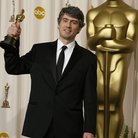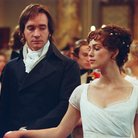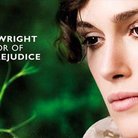Pride And Prejudice By Dario Marianelli
The house is not what you’d expect: a small, yellow-bricked terraced affair tucked away in a modern north London cul-de-sac. Through the house’s grimy front windows, it is barely possible to see into Dario Marianelli's living room, where old furniture is stacked floor to ceiling.
But behind this low-key façade, film composer Dario Marianelli has built a collection of keyboards and computers over the years, converting a small double bedroom into a studio where he writes music for some of the biggest names in film.
“Terry Gilliam came round last week,” he says while showing me up the narrow front staircase. “I’m just renting the room from a friend until I can build my own studio.”
We’ve met to discuss Marianelli’s latest score, for Joe Wright’s film of Pride And Prejudice. Based on Jane Austen’s turn-of-the-19th-century romance, it stars Donald Sutherland as the father of five girls who are eagerly elbowed into marriage by their mother (Brenda Blethyn).
Keira Knightley plays the outspoken daughter, Elizabeth Bennet, who yearns her way through a confused yet romantic courtship with taciturn Mr Darcy (Matthew Macfadyen) that brings her face-to-face with the autocratic Lady Catherine de Bourgh (Judi Dench).
The soundtrack that accompanies this all-star cast features French virtuoso pianist Jean-Yves Thibaudet, conductor Benjamin Wallfisch and the English Chamber Orchestra.
Indeed, most cues point to the piano in Austen’s Pride And Prejudice, not least because Elizabeth and Georgia, Darcy’s sister, both play. Marianelli obliges with a 19th-century pastiche for orchestra and piano that’s redolent of Beethoven’s early piano sonatas, as well as borrowing from the more florid rhetoric of Chopin, Brahms and Ravel.
His finest writing emerges in two pivotal piano themes – the first heard during the film’s opening shots of English countryside at dawn, the second for piano and orchestra as Elizabeth reflects upon a sculpture of Darcy at his family home.
“Beethoven was one of the most innovative composers of Jane Austen’s time, so he’s suited to Elizabeth’s forward-thinking character.” Marianelli adds that, as a pianist himself, other composers naturally infiltrated his style.
Born in Pisa, he was raised on a diet of Debussy and Wagner, regularly visiting the opera in Florence and Milan with his parents. After training as a pianist at his local school and taking lessons in counterpoint and polyphony, Marianelli moved to London, studying film composition at the Guildhall School of Music and Drama and the National Film and Television School.
Since then, he’s written melancholic scores for BAFTA-winning films, including Michael Winterbottom’s In This World and Asif Kapadia’s The Warrior, which has opened the door to more recent projects such as Terry Gilliam’s soon-to-be-released adventure movie, The Brothers Grimm.
“Terry called me up after hearing In This World,” Marianelli says. “Up to that point, I’d been working mainly on moody, atmospheric scores, so his first question was, could I write fast music?”
But of all Marianelli’s 20-or-more screen scores, Pride And Prejudice has given him the greatest scope to explore classical repertory. In one scene, Elizabeth and Darcy dance to a theme from Purcell’s Dido And Aeneas, half-harmonised by Marianelli; in another, he gives the same composer a neo-romantic makeover.
Thibaudet, a master of tone colour, complements Marianelli’s moments of Ravel-styled impressionism and clearly revels in the excessive rubato that laces his motifs. A tsunami-sized gush of orchestral schmaltz washes the film’s climax into self-parody, but elsewhere his effectively simple piano themes provide conclusive proof that you should never judge a soundtrack by its studio.





